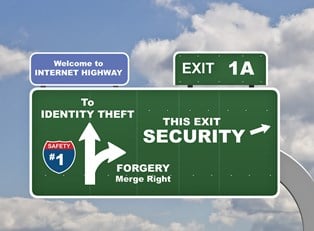Identity theft can take many different forms, and the steps you need to take vary depending on what exactly has happened to you. Being the victim of a data breach that leaked passwords, for instance, is different than losing your wallet. But whatever happens, here are some steps you should take that are always a good idea in the event that your identity may be compromised.
Report It
If your identity is stolen, you're going to have to notify a lot of organizations. One of them is the FTC. The Federal Trade Commission has an entire identity theft recovery website set up, where you can report what's happened to you and receive a personal recovery plan and get government assistance by filling out forms.
If you know for sure someone has opened fraudulent accounts, you need to call the bank or credit card company where the fraud occurred. Explain to the fraud department what happened, and ask them to close or freeze the accounts.
Additionally, it never hurts to notify your own financial institutions. Have them cancel and reissue your credit cards, and change all of your logins, passwords, and PINs for your own accounts.
Notify the local police. Combining the FTC ID Theft Affidavit with the police report gives you an identity theft report, and with it, certain rights.
If your social security number was compromised, you may want to notify the Social Security Administration and the Internal Revenue Service.
And finally, if somebody filed a fraudulent change of address on you, fill out a report with the U.S. Postal Inspection Service, the Post Office's investigative branch.
Notify Credit Bureaus and Request Your Credit Reports
You can place a fraud alert for free with any one of the major credit bureaus -- Experian, TransUnion, and Equifax -- and they will notify the others for you. This places a mark on your credit report that makes it harder to open new accounts. After 90 days, you can re-up the account. You can also full-on freeze your credit report, but there may be a charge to do so.
You're entitled to a free annual report from each bureau. If you've already cashed that in this year, pay to get another report, or you can follow their fraud alert confirmation instructions and get a free report, but you're going to have to wait for it.
Keep Your ID Theft Report Handy
We mentioned that combining your FTC ID Theft Affidavit with your local police report gives you an ID Theft Report. If the police can't give you a copy of the report, have them sign your FTC complaint form with the police report number. (And keep the officer's contact info handy.) You will have to go back around and show this report to your creditors and to the credit reporting agencies. Having this will help them help you.
Get a New Driver's License
Nobody likes the DMV, but it's worth putting up with the line for the sake of protecting your identity. Having a new driver's license number can help stem the tide of fraudulent accounts.
Contact Your Utility Companies
Using your existing bills as proof of residence, contact your phone company and any other utility providers and let them know that someone may be trying to open fraudulent accounts in your name.
Notify Your Insurance Company
Given the rise of medical ID fraud , you'll want to make sure you go over your benefits statement with a fine-toothed comb, and you'll want to make sure that your insurance company is on the lookout, as well.
Be Cautious Going Forward
Be wary, and protect your information. Create strong passwords, and don't use the same password for everything. Shred personal information instead of just throwing it away. Don't put too much information on social media. (Facebook doesn't really need your phone number or address, however much it begs.) Run spyware/malware/virus protection to prevent keylogger software from infiltrating your computer and stealing your passwords.
Consider ID Theft Protection
Companies like LifeLock, Identity Guard, and Identity Force can monitor your credit information, as well as your personal info floating around on the Internet, and they'll help you (to varying degrees) with putting your life back together by completing some of these steps for you. While there are free resources out there, including via the FTC, having someone walk you through the process -- or even take care of it for you through power of attorney -- can be a real relief.



